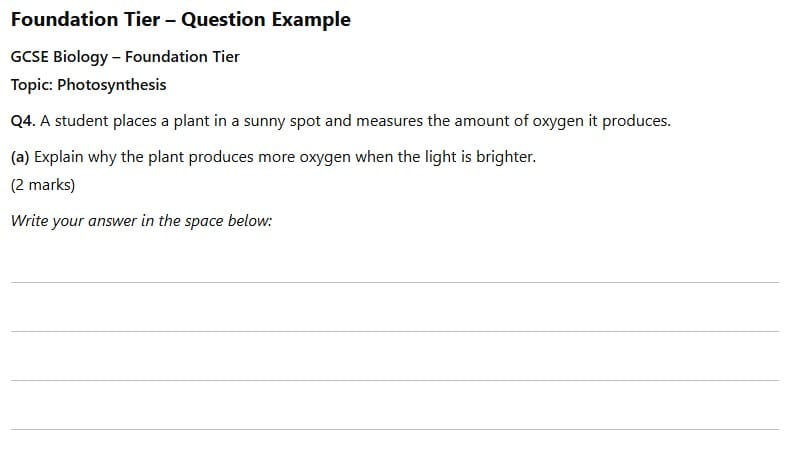
Should My Child Take Foundation or Higher Tier Science at GCSE? A Simple Guide for Parents
10/04/2025 / Science TuitionChoosing between Foundation and Higher Tier Science at GCSE can feel like a daunting decision for parents. This article explores Foundation vs Higher Tier GCSE Science to help guide your decision. It is one of those educational crossroads that might have long-term implications, especially when it comes to future studies and career options. This guide is here to help you understand the key differences between the two tiers and offers a clear picture of which pathway may suit your child best.
At Principal Tutors, we specialise in one-on-one private tuition delivered by UK-qualified teachers designed to help students improve their understanding, boost exam performance, and build confidence in GCSE Science.
Understanding the Two GCSE Science Pathways
GCSE Science is tiered to ensure students are assessed in a way that aligns with their ability level. These GCSE exam tier options are structured to support a wide range of learning needs. The two tiers are Foundation and Higher. Each tier covers the same topics but differs in how deeply each topic is explored and the grades that can be achieved.
The Foundation Tier is aimed at students who are expected to achieve between a grade 1 and grade 5. It can be helpful to think of this as Foundation Tier Science explained in simpler terms. The exam questions are generally more straightforward, designed to assess basic understanding and recall. On the other hand, the Higher Tier is geared toward students who can handle greater academic challenge, with the potential to earn grades ranging from 4 to 9. These exams involve more complex problem-solving and a deeper understanding of scientific concepts.
Who Should Consider Foundation Tier?
The Foundation Tier is a solid choice for students who don’t enjoy or find science difficult or who are predicted to achieve no higher than a grade 5. It’s particularly suitable for students who feel overwhelmed by the pace and content of higher-level science and who would benefit from focusing on core principles presented in a more accessible way.
For some students, being placed in the Foundation Tier can be a confidence boost. Rather than struggling to keep up with harder content and risking failure, they can consolidate their understanding and work toward a strong pass, which is often sufficient for many post-16 routes, particularly vocational or mixed course options.
Who Should Consider Higher Tier?
Higher Tier is typically best suited for students who are aiming for grade 6 or above in their GCSEs. One of the main Higher Tier Science benefits is access to higher grades and more academic routes. These students may be interested in pursuing science at A-level or in a future STEM career. They are usually comfortable with more advanced scientific terminology and concepts, and can express their understanding clearly in longer, often more abstract questions.
Taking Higher Tier opens access to the highest possible GCSE grades, which can be important for competitive sixth form or college programmes. However, the content is more challenging, and there is a risk that if a student does not perform well, they could receive a grade U (ungraded), as the minimum grade available is a 4.
Comparing the Tiers
While the topics studied in Foundation and Higher Tiers are generally the same, the level of complexity is different. Higher Tier includes more demanding mathematical elements, especially in Physics, and questions that require students to apply their knowledge in new or unfamiliar situations.
Another key difference lies in the grading. Foundation Tier caps at grade 5, meaning even a perfect exam performance will not earn a grade 6 or higher. This is a crucial factor to consider, particularly for students with long-term academic goals that may require higher GCSE science grades.
To help illustrate the difference between Foundation and Higher Tier, here are two example GCSE Science exam questions that cover the same topic but reflect the varying levels of depth and challenge expected at each tier.

Expected Answer:
- More light increases the rate of photosynthesis
- Photosynthesis produces oxygen as a by-product
Skills Tested:
- Basic understanding of the link between light and photosynthesis
- A simple cause-effect explanation

Expected Answer:
- Temperature affects the rate of photosynthesis
- If temperature changes, it introduces a second variable
- This could alter oxygen production, making it unclear whether light or temperature caused the change
Skills Tested:
- Understanding of variables in experimental design
- Application of knowledge to a practical context
- Evaluation of scientific method
A UK-qualified and experienced science tutor can offer personalised insight into your child’s strengths and learning style, helping you make a well-informed decision about whether Foundation or Higher Tier is the right fit.
How Are Tier Decisions Made?
For many schools, choosing the right GCSE Science tier involves careful evaluation.
Typically, schools begin considering which tier is most suitable for each student during Year 10 or early Year 11. The decision is usually based on performance in class, homework, and mock exams, as well as teachers’ professional judgement. In many cases, parents and students are involved in the conversation too.
Students are usually entered for their chosen tier early in the final year of GCSE study, though this can vary. It’s important to stay in touch with the school to understand how and when the decision is being made.
Can Students Change Tiers?
Yes, students can switch between Foundation and Higher tiers before the final exam entry deadlines, which typically occur in the spring of Year 11. For instance, AQA’s deadline for tier changes without incurring late fees is usually around 21 April.
However, making such changes later in the course can be challenging. It may necessitate additional revision to cover differences in content and exam techniques. Regular assessments and ongoing communication with teachers are crucial throughout the GCSE years to ensure students are entered for the most appropriate tier.
Hire a private, online Science tutor >
What If a Student Aims Too High or Too Low?
Choosing a tier that doesn’t match a student’s ability can be risky. A student placed in Higher Tier who struggles with the content may end up with a grade U if they fail to meet the minimum requirements. Conversely, a student who might have achieved a higher grade in the Higher Tier could feel underchallenged and disappointed with the grade ceiling in Foundation.
The key is to aim for the right level of challenge—enough to motivate without overwhelming. Teachers usually have a good sense of where that line lies for each student.
How Tiers Affect Post-GCSE Opportunities
Foundation Tier can limit some academic options. For example, most schools and colleges require at least a grade 6 in science to be eligible for A-level science courses. If your child is interested in studying biology, chemistry, or physics at a higher level, they’ll likely need to take Higher Tier and achieve strong grades.
These Science GCSE pathways can still lead to rewarding careers and educational opportunities. Many vocational and technical courses accept students who have taken Foundation Tier science, as long as they meet the overall entry criteria. It’s always a good idea to check the requirements for any future pathways your child is considering.
Does Tier Choice Impact University Admission?
In most cases, universities do not scrutinize GCSE science as closely as they do A-level results. However, competitive courses, particularly in medicine or engineering, can help to show a strong science foundation from the start. Taking Higher Tier Science, especially if followed by A-levels, can demonstrate both ability and commitment.
Supporting Your Child in the Decision
As a parent, your role is to guide, support, and listen. This guide is part of making sense of GCSE Science for parents who want to support informed choices. Discuss the options with your child, attend school meetings, and ask questions if you’re unsure about what’s being proposed. Encourage your child to think about their interests, strengths, and goals, and help them reflect on where they’re most likely to thrive.
Encouraging regular revision, helping them stay organised, and reminding them that both tiers can lead to success in different ways will go a long way in easing any stress or confusion they may feel.
Get Expert Support: Request a Private GCSE Science Tutor Today
There’s no one-size-fits-all answer when it comes to choosing between Foundation and Higher Tier Science at GCSE. Whether your child takes Foundation or Higher Tier GCSE, the key is finding the right fit. The best choice is the one that aligns with your child’s current ability, future goals, and confidence in science. Whether your child takes the Foundation or Higher Tier, what matters most is that they feel supported and motivated to do their best. With the right guidance and preparation, they can achieve a result they can be proud of.
Helping your child succeed in GCSE Science doesn’t have to be stressful. With guidance from a UK-qualified tutor, your child can build a solid understanding of science, develop effective study habits, and gain the confidence to thrive both in their GCSEs and in their future learning journey.
At Principal Tutors, we provide one-on-one private tuition tailored to your child’s unique learning needs. Our experienced Science tutors are UK-qualified teachers with extensive classroom experience, ensuring that your child receives expert support from educators who truly understand the subject and exam requirements. Whether your child needs help with tricky topics, understanding practical-based tasks, or improving their study approach, our tutors offer the structured support they need to unlock their full potential.
As a multi-award-winning tuition company, we make the process simple and hassle-free. Our Tutor-Match service ensures your child is paired with the right tutor, and with our flexible online Science tuition, lessons can be scheduled around your child’s needs. We also offer a simple pay-as-you-go pricing model, so you only pay for the lessons you need.
Every tutor is DBS-checked, offering a safe, structured, and professional learning experience.
Request a tutor today and give your child the best chance of success!
Mike
We are so happy with our 11+ tutor, she is always very professional and approachable, and she is helping my son to gain in confidence for his grammar school entrance exams next term.
Sheila
Very happy with the Tutor who is working with my daughter for the 11+. He always replies to emails promptly, engages my daughter during the online lesson, and she's enjoying the work. Thank you.
Nicole
We were recommended a tutor for our needs very quickly and were able to start immediately. My daughter is getting tutoring for her 11+ exam and according to her, the tutor is amazing. There is a long way until the exam but she managed to bust my daughter's confidence in Maths. Thank you!
Danielle
Thank you for recommending such an amazing physics tutor for my son. We are now confident he will achieve the graded he needs to get into the uni of his choice, which is all down to the support we received from Principal Tutors and our wonderful tutor.
